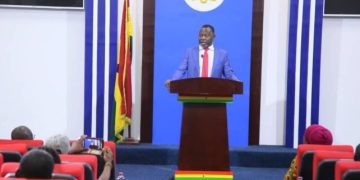
The Ghana Police Service has placed 25 policemen under investigations, following public complaints of alleged unprofessional behaviours.
The complaints were received from civilians through recently advertised police contact lines for the public to report errant policemen and women.
The call centre was activated on November 11, 2019, with the police asking the public to reach them with complaints on 0550323323, 0275000156 or 0206639121.
Reacting to a recent Afrobarometer survey that puts the police on top of the corruption perception index as the most corrupt institution in the country, the Director-General of the Police Public Affairs Directorate, Assistant Commissioner of Police (ACP) Mr David Eklu, welcomed the 2019 Afrobarometer report but said the Police Administration was taking critical steps to address the weaknesses.
“Perception is difficult to erase,” he said, after agreeing that even though corruption persisted in the service, it had reduced.
Afrobarometer report
The report, launched in Accra last Tuesday, also cited the Judiciary and parliamentarians as being corrupt.
While 57 per cent of the people interviewed perceived the police to be the most corrupt, 40 per cent pointed to judges and magistrates as the second most corrupt, with Members of Parliament (MPs) following in that order with 36 per cent.
Civil servants, as well as tax officials, tied at 34 per cent.
Partnership
Mr Eklu said even though the findings of the Afrobarometer survey had not been officially made available to the Ghana Police Service, the various media reports had caught the attention of the police.
He said after the 2018 Afrobarometer report, the police held a meeting with the Centre for Democratic Development, Ghana (CDD-Ghana) and other anti-corruption agencies, during which it was agreed that after surveys, the full reports, recommendations and the specific areas fueling the corruption perceptions should be spelt out and made available to the agencies concerned.
The specifics, he said, were needed because the police rendered various services, apart from law enforcement and investigations.
“We render services such as traffic management and a range of other duties, so it will be useful for these anti-corruption agencies to specify where some of these corruption perceptions are fueled,” Mr Eklu said.
Measures
On why the police continued to top the corruption perception index, he said CDD-Ghana admitted that it was so because the police had regular interaction with the public in the course of their work.
To change that perception, he said, the Police Adminstration had taken pragmatic steps to educate the public on the services the police rendered, especially on the issue of “bails being free”.
Mr Eklu said the administration had reoriented personnel of the Motor Traffic and Transport Department (MTTD) and made it mandatory for them to wear name tags for easy identification by the public.
He said the police were part of the national anti-corruption framework and were undertaking an internal corruption awareness campaign and publishing the official statutory fees charged for services such as police clearance and accident report that attracted statutory charges.
Source: Daily Graphic | Ghana


























